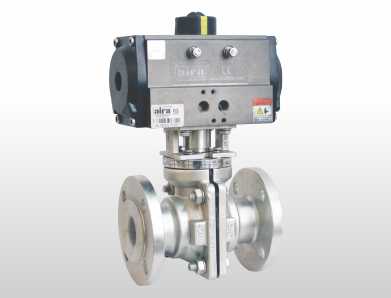Fluoropolymer or ceramic linings are apply to all wetted internal parts of a lined ball valve.
Valve bodies lined with fluorocarbons, such as PFA and PTFE, combine the excellent mechanical properties of metallic bodies with corrosion resistance.
The intricately shaped inside surfaces of a valve present a challenging engineering challenge. Especially for achieving a uniform thickness and the highest lining quality without any cavities or inclusions.
This lining process ensures a tight bond between the lining and the inside of the body. The lining is effectively prevent from being share away from the body in part or completely.
We can accommodate special options, such as reinforced PTFE bellows seals or adjustable packings. As an option, bellows seals made of special metals, such as titanium or Hastelloy, are also available.
Ball valves with linings are ideal for corrosive applications, offering very reliable performance, tight shutoff, constant torque, and no maintenance. In industries such as chemical, petrochemical, pharmaceutical, and pulp and paper, lined ball valves can successfully apply to corrosive applications.
Teflon Lined Valve – Excellent Anti-Corrosion Solution
Today, many industries are using chemical compounds in their daily production process. Chemical compounds can come in the form of solids or liquids, and they are store in basins and pipes that lead to the site of use. Tanks and pipelines must also be made from chemically-resistant materials to ensure safety and avoid risks.

- For chemical industrial applications, lined valves are a safe and reliable solution to corrosion flow. Valve and fitting linings ensure extremely high chemical resistance and longevity.
- With a line valve, all wet surfaces are made up of plastic material. Usually fluorocarbon. Metallic parts of a lined valve is made of relatively inexpensive materials, such as ductile iron. In a fully lined valve, no metal parts come into contact with the media.
Also, read Plug Valve
PTFE (Teflon) is a polymer compound form by polymerizing tetrafluoroethylene with excellent chemical stability, corrosion resistance, sealing, high lubricity, non-viscosity, electrical insulation, and good aging resistance for media such as strong acid, strong alkali, and strong oxidation. The operating temperature is -200*180°C, with poor fluidity and large thermal expansion.
Teflon-lined valves are increasingly use due to the following benefits:
- Teflon is virtually inert to most chemicals at high concentrations.
- Teflon is highly temperature resistant and can withstand temperatures up to 250 degrees C.
- The valve liner makes from metal, only the inner lining is Teflon, so it is resistant to impact and high pressure (note that at high temperatures and pressure). Unlike plastic pipes that can only deal with high pressure at low temperatures, and vice versa.
Practical application of lined valve:
- Valves lined with PTFE and PFA are the most commonly use valves for corrosive applications in chemical and pharmaceutical industries, petrochemical plants, fertilizer plants, pulp and paper plants, and metallurgical plants.
- Daviteq is supplying the following lined valves:
- Daviteq is currently the official representative of Crane Group in Vietnam. We specialize in high-performance lined valves for the chemical and industrial industries.
Lined Ball Valve
Model FELB corrosion-resistant ball valves have sizes from 1/2″ to 8″ inch and maximum temperatures of 230°C. Pressure up to10 BAR.
Aira Euro Automation is a leading actuated PFA Lined Ball Valve in India. Aira has a vast variety of ball valves such as the PFA lined ball valve which is operate by a pneumatic actuator.